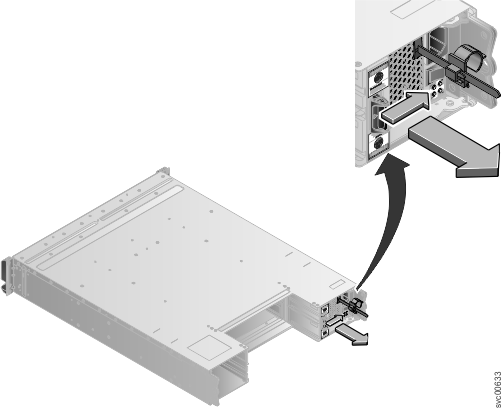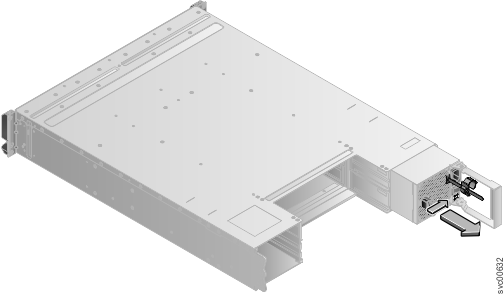You can replace either of the two 764 watt hot-swap redundant
power supplies in the control enclosure. These redundant power supplies
operate in parallel, one continuing to power the canister if the other
fails.
DANGER
When working on or around the system, observe
the following precautions:
Electrical voltage and current from
power, telephone, and communication cables are hazardous. To avoid
a shock hazard:
- If Lenovo supplied a power cord(s), connect power to this unit
only with the Lenovo provided power cord. Do not use the Lenovo provided
power cord for any other product.
- Do not open or service any power supply assembly.
- Do not connect or disconnect any cables or perform installation,
maintenance, or reconfiguration of this product during an electrical
storm.
- The product might be equipped with multiple power cords. To remove
all hazardous voltages, disconnect all power cords.
- Connect all power cords to a properly wired and grounded electrical
outlet. Ensure that the outlet supplies proper voltage and phase rotation
according to the system rating plate.
- Connect any equipment that will be attached to this product to
properly wired outlets.
- When possible, use one hand only to connect or disconnect signal
cables.
- Never turn on any equipment when there is evidence of fire, water,
or structural damage.
- Disconnect the attached power cords, telecommunications systems,
networks, and modems before you open the device covers, unless instructed
otherwise in the installation and configuration procedures.
- Connect and disconnect cables as described in the following procedures
when installing, moving, or opening covers on this product or attached
devices.
To disconnect:
- Turn off everything (unless instructed otherwise).
- Remove the power cords from the outlets.
- Remove the signal cables from the connectors.
- Remove all cables from the devices.
To connect:
- Turn off everything (unless instructed otherwise).
- Attach all cables to the devices.
- Attach the signal cables to the connectors.
- Attach the power cords to the outlets.
- Turn on the devices.
- Sharp edges, corners and joints might be present in and around
the system. Use care when handling equipment to avoid cuts, scrapes
and pinching.
Attention: Even though many of these components are hot-swappable,
they are intended to be used only when your system is not active (no
I/O operations). If your system is powered on and processing I/O operations,
go to the management GUI and follow the fix procedures. Initiating
the replacement actions without the assistance of the fix procedures can result in loss
of data or loss of access to data.
Attention: A powered-on enclosure must not have a power
supply removed for more than five minutes because the cooling does
not function correctly with an empty slot. Ensure that you have read
and understood all these instructions and have the replacement available,
and unpacked, before you remove the existing power supply.
Even though many of these components are hot-swappable, they are
intended to be used only when your system is not active (no I/O operations). If your system
is powered on and processing I/O operations, go to the management GUI and follow the fix procedures. Initiating the replacement actions
without the assistance of the fix procedures can result in loss of
data or loss of access to data.
Be careful when
you are replacing the hardware components that are located in the
back of the system that you do not inadvertently disturb or remove
any cables that you are not instructed to remove.
Attention: In some instances, it might not be advisable
to remove a power supply unit when a system is performing I/O. For
example, the charge in the backup battery might not be sufficient
enough within the partner power-supply unit to continue operations
without causing a loss of access to the data. Wait until the partner
battery is 100% charged before replacing the power supply unit.
Ensure that you are aware of the procedures for handling static-sensitive
devices before you replace the power supply.
A replacement power supply unit is not shipped
with a battery; therefore, transfer the battery from the existing
power supply unit to the replacement unit.
To replace the power supply, perform the following steps:
- Read the safety information to which Preparing to remove and replace parts refers.
- Examine the Identify LED that is lit on the front of the
enclosure to identify the correct enclosure.
- Turn off the power to the power supply unit using the switch
at the back.
- Disconnect the cable retention bracket and the power cord
from the power supply that you are replacing.
- Remove the power supply unit. Record the orientation of
the power supply unit. Power supply unit 1 is top side up, and power
supply unit 2 is inverted.
- Depress the black locking catch from the side with the
colored sticker as shown in Figure 1.
Figure 1. Directions for lifting the handle on the power supply unit

- Grip the handle to pull the power supply out of the
enclosure as shown in Figure 2.
Figure 2. Using the handle to remove a power supply unit

- Insert the replacement power supply unit into the enclosure
with the handle pointing towards the center of the enclosure. Insert
the unit in the same orientation as the one that you removed.
- Push the power supply unit back into the enclosure until
the handle starts to move.
- Finish inserting the power supply unit into the enclosure
by closing the handle until the locking catch clicks into place.
- Reattach the power cable and cable retention bracket.
- Turn on the power switch to the power supply unit.
If required, return the power supply. Follow all packaging
instructions, and use any packaging materials for shipping that are
supplied to you.

